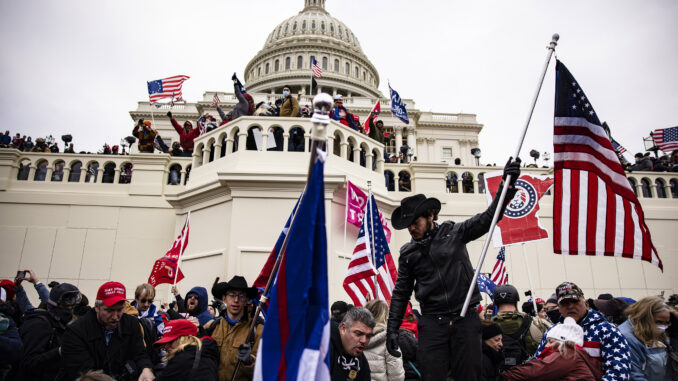
The US, which claims to be the prime target of global terrorism and has 67 ‘foreign terrorist organizations’ covered under its laws, has no provision like ours to ban domestic seditious organizations. Like India after the repeal of POTA and TADA, the US uses other penal laws for prosecution as it doesn’t have any law to make domestic terrorism a punishable crime. In India, we use IPC and UAPA for prosecuting terrorists. With legal limitations, there are worries over getting convictions in the Capitol Hill attack case against those who had indulged in violence. Reuters

On September 30, former IPS officer SR Darapuri, now vice-president of the People’s Union for Civil Liberties in Uttar Pradesh, described the Union Home Ministry’s ban on the Popular Front of India (PFI) as ‘premature’ as the proscription was imposed before court verdicts. An English daily opined that the ban could “only end up strengthening the sense of disquiet at the treatment of minorities” with the danger of further radicalization as a clear case-to-case judicial process was not followed.
On the same day, a National Investigation Agency (NIA) court in Mumbai acquitted Arshi Qureshi, in jail for six years, of all charges under the Unlawful Activities (Prevention) Act (UAPA). In 2016, he had allegedly influenced some individuals from Kerala to go abroad to join the Islamic State (IS) on behalf of Zakir Naik’s Islamic Research Foundation (IRF). The media said Qureshi’s attempt was cited as one of the reasons to ‘ban’ the IRF in 2016.
Meanwhile, on September 27, Stewart Rhodes, founder of American far-right group ‘Oath Keepers’, went on trial with four others in Washington DC for “seditious conspiracy and use of force on January 6, 2021, to prevent the transfer of presidential power to Joe Biden”. The prosecutors alleged that ‘Oath Keepers’ had stashed “guns just outside Washington DC for a quick reaction force to rush into the city.”
These seemingly unconnected incidents are relevant for ascertaining whether a ‘case-to-case judicial process’ is more effective than a ‘ban’ in checking seditious elements such as the PFI. Qureshi’s case would underline the difficulty of expecting favorable results in terror-related prosecutions in India as a prerequisite for such bans.
The US, which claims to be the prime target of global terrorism and currently has 67 “foreign terrorist organizations” (FTOs) covered under its laws, has no provision like ours to ban domestic seditious organizations. Like India after the repeal of the Prevention of Terrorism Act (POTA) and the Terrorist and Disruptive Activities Prevention Act (TADA), the US uses other penal laws for prosecution as it does not have any law to make domestic terrorism a punishable crime. In India, we use IPC and UAPA for prosecuting terrorists. However, the US is handicapped, as it has no ‘domestic terror crime,’ nor the power to ‘ban.’
Contrastingly, FTOs can be ‘sanctioned’ (‘banned’) under Section 219 of the Immigration and Nationality Act (INA). This, along with the Department of Treasury notifications, would result in ordering entry restrictions, freezing of assets and imposing other financial impediments to prevent them from spreading their influence into the US. Besides, any US citizen providing support to an FTO is liable to be sentenced to 15 years in prison under Section 2339A of US Code No. 18, which could be enhanced to life term if deaths are caused by the FTO. Section 2331 defines ‘international terrorism’ and ‘domestic terrorism’ but lays down no criminal penalties for the latter. Consequently, the FBI and other agencies use other penal provisions to deal with threats from white supremacists like the January 6, 2021, Capitol Hill insurrection.
To us, in India, this situation may appear chaotic. It is for this reason that President Joe Biden had promised to enact a domestic terrorism law during his 2020 campaign. It is also learnt that the FBI Agents’ Association, which represents nearly 14,000 agents, has been lobbying with the Congress to pass a federal law on domestic terrorism, making it punishable. However, progress even now is tardy.
The reason for this is the fierce opposition from academics and human rights groups such as American Civil Liberties Union to put fetters on domestic organizations even if they are found to be taking liberties with the law, in which case only normal penal laws should be applied. They feel any other action like a ‘ban’ will violate the First Amendment. Even a leading ‘progressive’ Democrat, Alexandria Ocasio-Cortez, a Bernie Sanders follower who was vice-chairwoman of a house committee, had opposed special laws. This difficulty in formulating ‘domestic terrorism’ laws came to the fore during investigations by the US House Select Committee, which started public hearings on July 27, 2021, regarding the Capitol Hill violence. Yet, a draft Bill, Domestic Terrorism Prevention Act of 2022, reintroduced after the racially motivated mass killing of 10 persons in a Buffalo supermarket in May, was passed only with a narrow majority in the lower house on May 18, but its fate in the Senate is uncertain.
With all these legal limitations, there are worries over getting convictions in the Capitol Hill attack case against ‘Oath Keepers’ and ‘Proud Boys,’ the pro-Trump white supremacists, who had indulged in violence, challenging the very essence of the US democratic system. This is also, because under the 1807 Insurrection Act, the US President could order even private ‘militias’, presently numbering 200, to put down any violence — and don’t forget, President Trump was in office on that day.
A similar federal prosecution for sedition against a far-right militia, ‘Hutaree,’ in Michigan for plotting to kill policemen had failed in 2012, as the prosecution could not prove that they had done anything beyond expressing ‘hatred’. This was despite FBI’s long-infiltration operation into ‘Hutaree’ before prosecution.
The point is that other democratic countries are also experiencing serious domestic terror situations and not all of them are able to choose the easy way of ‘banning’ such organizations. Besides, the ban on the PFI is 12 years late — it should have come immediately after July 4, 2010, when its members chopped off Prof TJ Joseph’s hand. As to the question whether such bans would check future seditious activities, the answer is ‘no.’ The government admits that banned SIMI cadres had migrated to ISS-NDF-PFI and SDPI, thus exposing the difficulties of checking seditious elements that way.
(The author is Ex-Special Secretary, Cabinet Secretariat, Government of India)





Be the first to comment